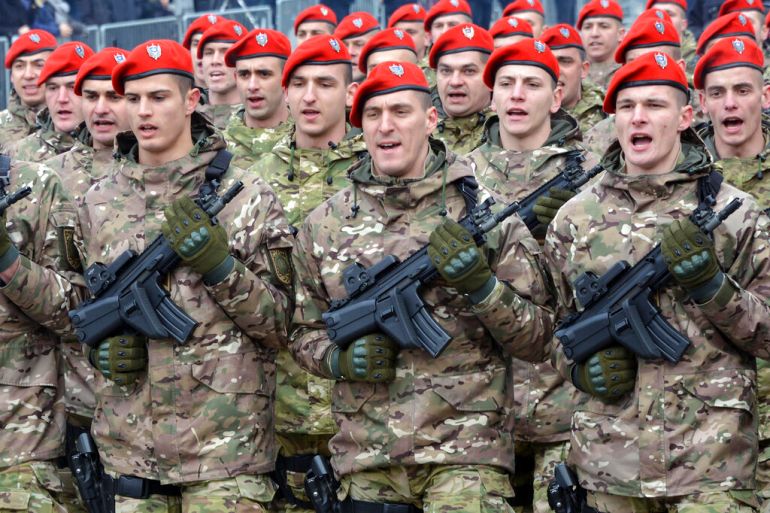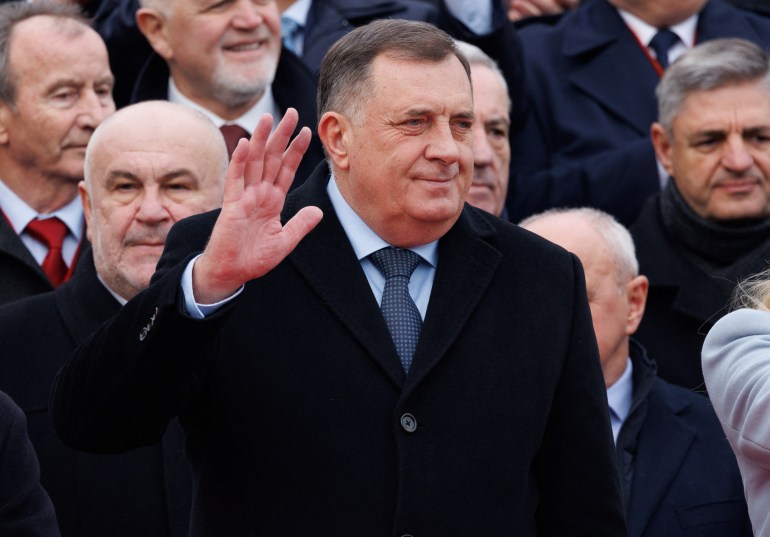Bosnian Serbs hold nationalist celebration despite ban, sanctions
Bosnia’s Constitutional Court has declared the holiday illegal as it discriminates against Muslim Bosniak and Catholic Croat communities.

Bosnian Serbs have held public celebrations to mark their autonomous Serb Republic’s national holiday, defying a top court’s ban of the commemoration and US sanctions slapped on their leader Milorad Dodik this week.
The January 9 holiday commemorates the date in 1992 when Bosnian Serbs declared the creation of their own state in Bosnia and Herzegovina. It ignited a devastating, nearly four-year-long war which led to some 100,000 people being killed.
Keep reading
list of 4 itemsSerbian anti-mining activists block bridges, roads
Serbia’s leader defends right to buy weapons where he wants
Western Balkan groups call for US engagement to counter Serbia
The date also coincides with a Serbian Orthodox Christian holiday, and it was this religious component that led Bosnia’s Constitutional Court to declare the holiday illegal as it discriminated against the region’s Muslim Bosniak and Catholic Croat communities.
Taking part in the parade on Sunday were more than 800 armed police officers, including members of anti-terrorist units, gendarmerie and cavalry, who marched alongside students, war veterans and athletes through the streets of the region’s largest city Banja Luka.
Crowds of onlookers and those marching waved Serb red, blue and white flags. The members of a special police unit sang songs referring to the Serb Republic as the state of Christian heritage.
Al Jazeera’s Liljana Smiljanic, reporting from Banja Luka, Bosnia, said while for the Serbs the date was a “sacred” one, it meant something completely different for Bosniaks.
“They [Bosnian Serbs] say it [January 9 holiday] guarantees liberty for them, and the best conditions to live in Bosnia and Herzegovina. On the other hand for Bosniaks … it is the start of the war horrors that they endured during the 90s, and later on war crimes and genocide in Srebrenica,” she added.

The parade and other ceremonies were attended by the top officials of neighbouring Serbia, including Prime Minister Ana Brnabic and Parliament Speaker Ivica Dacic. Russian and Chinese diplomats in Bosnia and several officials of France’s far-right National Rally party were also present.
There was no sign of the Serb regiment of Bosnia’s joint armed forces, which had been deployed to the parade in previous years. Instead, the focus was on the militarised police force, which led the parade with specially-designed combat vehicles as helicopters hovered above.
Secessionist ambitions
Dodik who is currently serving as the Serb member in Bosnia’s tripartite interethnic presidency, said “there is no freedom for the Serb people without the state”, in an address to the crowd watching the parade.
The pro-Russian nationalist has repeatedly threatened to pull out the Serb representatives from Bosnia’s armed forces, tax system and judiciary and create separate Serb institutions.
Last Wednesday, he was freshly sanctioned by the United States for corruption and threatening the stability and territorial integrity of Bosnia.
The US-brokered Dayton Peace Agreement in 1995 ended three-and-a-half years of ethnic warfare in Bosnia, dividing the Balkan country into two autonomous regions – the Serb Republic and the Federation dominated by Bosniaks and Croats.
“Everything that he does and announces that he will do is not in accordance with the constitution of Bosnia Herzegovina as well as with the Dayton Peace Accord,” Al Jazeera’s Smijanic said.
“That is a base for everything here in this country,” she added.
Dodik’s secessionist rhetoric of recent months has encouraged Serb nationalists, who in recent days have provoked incidents across the Serb Republic, firing in the air near mosques during prayers, publicly praising convicted war criminals and threatening their Muslim neighbours.
He has described Bosniaks as “second-rate people” and “treacherous converts” who sold their “original [Orthodox Christian] faith for dinner”.